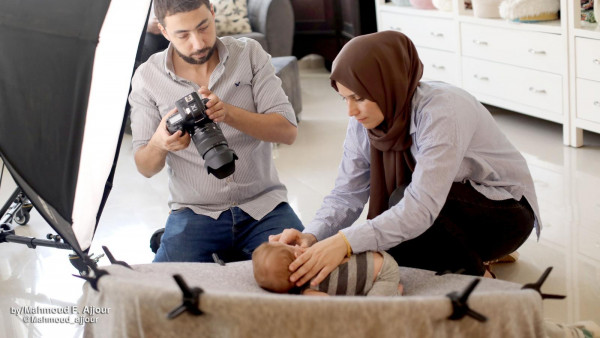Yahia graduated with a multimedia degree from Al-Azhar University, a place deeply affected and destroyed by Israeli attacks. Before this, he had gained experience in radio and filming, eventually establishing his studio with a specific focus: capturing the precious moments of newborn babies in Gaza.
Yahia began his journey in newborn photography when his sister gave birth. He took photos of her baby and posted them on social media platforms, where his followers greatly admired them in Gaza.
He recalls facing many challenges, including a lack of material resources and difficulty accessing photography accessories, which he had to buy online at triple the price due to the blockade imposed on the Gaza Strip.
“His studio, once filled with the soft and delicate props and canvas of some of the newborns in Gaza, now lies shattered and silent, a victim of the Israeli military violence”
“Success in Gaza is exceptionally challenging due to the weak economic conditions. At times, there’s a sense of scepticism about whether your business will flourish with people living under siege. However, it was pleasantly surprising to find that everyone embraced the concept of preserving memories of their newborn babies. It proves our Gazan spirit, renowned for our deep appreciation for life,” Yahia told The New Arab.
Yahia added, “It transformed into a family business, a dream and passion I pursued, a haven before the nightmare began where everything shifted from October 7.”
His studio, once filled with the soft and delicate props and canvas of some of the newborns in Gaza, now lies shattered and silent, a victim of the Israeli military violence.
“Each corner, each shattered frame, echoes with the voices of babies who once graced my lens, their tiny fingers and delicate features forever frozen in time and on my mind,” he said.
“Now, some of those innocent and pure souls I once lovingly captured are victims of this genocide against us. The thought of these babies being killed by the Israeli military fills my heart with pain, as I remember the days when I held them, swaddled them and photographed their innocence,” he expressed with deep agony.
The tragic death weighs heavily on Yahia’s heart; it is a relentless ache that refuses to fade as he clings to the memories of those fleeting moments of innocence and beauty.
He navigated the painful task of announcing the heartbreaking loss of some of these newborn babies after enduring the news of their passing.
“A photo of a newborn baby that I had taken went viral after a photojournalist captured it between the rubble of a bombed home and his family that were killed in the attack. It went viral and gained international attention from many newborn photographers too,” he explained.
“I aim to demonstrate to the world that these innocent babies, with all their purity, were targeted by the Israeli military. It was a means to expose the cruelty and horror of their actions”
Yahia had a clear vision for his Instagram page: to radiate positivity, joy, and beauty through the captivating photos of newborn babies in his Gaza studio.
He was committed to maintaining a space of hope and motivation for expectant mothers and followers, which is why he hesitated to share photos of babies who had passed away due to illness or accidents. He aimed to uphold a narrative of inspiration and celebration through his photography.
The war, however, changed everything. In a mourning community, individuals like Yahia are using their social media platforms to confront the stark realities of their existence and lives in Gaza.
Through each post, Yahia strives to humanise the statistics, to show the faces and names of those babies, hoping they will not be forgotten amidst the chaos and despair.
When questioned about his decision to use his Instagram platform to highlight the deaths of these babies by marking each photo with a black stripe, Yahia explained, “I aim to demonstrate to the world that these innocent babies, with all their purity, were targeted by the Israeli military. It was a means to expose the cruelty and horror of their actions.”
“Though I have always shielded my followers from the harsh truths of mortality, refraining from posting photos of babies that we heard had been lost, the magnitude of the current tragedies demands a different approach,” Yahia said.
Amid the chaos and devastation of Israeli attacks, there are countless newborns whose fate remains a haunting mystery to Yahia. What is even more chilling is the thought of those tiny souls who may still be buried beneath the rubble from the destruction of the attacks.
“At first, people did not believe that these newborn babies were from Gaza. They thought I was faking the whole announcement of the deaths of these babies or getting the photos from another photographer, most likely from the West, as they were in disbelief that we Gazans are capable of capturing such professional and aesthetically pleasing photos,” Yahia commented.
“I am sure that there are still many babies that I’m not yet aware of their deaths; some have been killed with their entire families,” said Yahia.
Yahia now holds an unbearable weight of responsibility and worry for his children’s safety, as he knows there is no going back to Gaza.
“We have to rebuild our lives from scratch. Returning to Gaza is not an option since both my business and home are completely in ruins. Even if we do return, the road to normalcy will be long. People are grappling with despair and sadness, making it difficult to focus on activities like photographing their babies,” Yahia said.
Like many desperate Gazans, Yahia resorted to using a GoFundMe page to appeal to a wider audience for financial support as he seeks safety elsewhere. The costs associated with evacuation can be high, with fees often reaching staggering amounts ranging from $6,000 to $12,000 per person.
Rodayna Raydan is a Lebanese British journalism graduate from Kingston University in London covering Lebanon
Follow her on Twitter: @Rodayna_462


